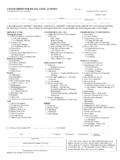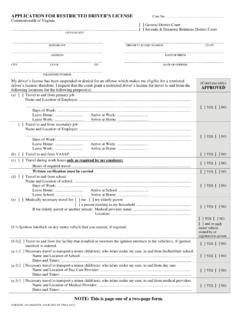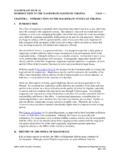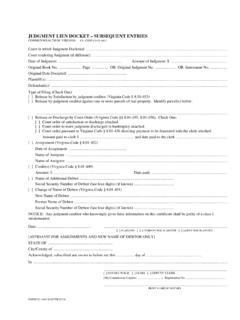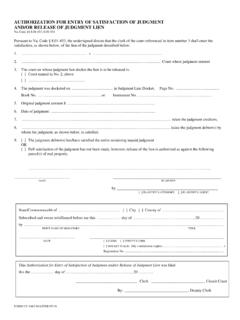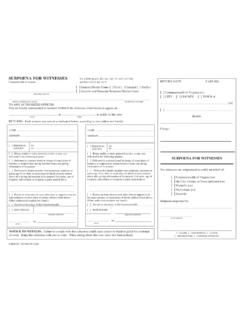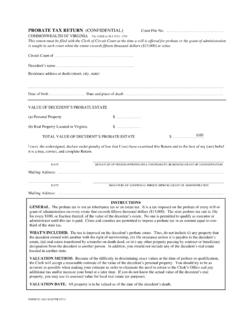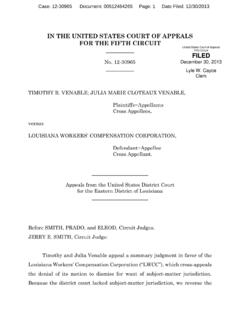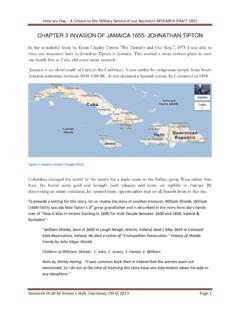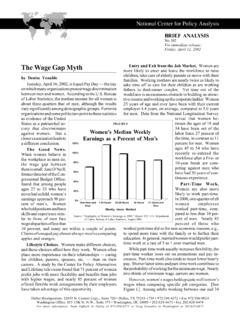Transcription of Present: Judges Benton, Humphreys and Petty JAMES PAUL ...
1 COURT OF APPEALS OF VIRGINIA. Present: Judges Benton, Humphreys and Petty Argued at Chesapeake, Virginia JAMES PAUL VENABLE, JR. OPINION BY. v. Record No. 0190-05-1 JUDGE ROBERT J. Humphreys . JULY 11, 2006. COMMONWEALTH OF VIRGINIA. FROM THE CIRCUIT COURT OF THE CITY OF NEWPORT NEWS. Edward L. Hubbard, Judge Oldric J. LaBell, Jr., for appellant. Susan M. Harris, Assistant Attorney General (Robert F. McDonnell, Attorney General, on brief), for appellee. Appellant JAMES Paul Venable, Jr. ( Venable ), a convicted sex offender, contends that the trial court erred in holding that he had violated a condition of his probation.
2 Venable reasons that his probation violation was predicated solely upon the fact that he was discharged from a court-ordered sex-offender counseling program after he refused to admit that he committed the crime for which he was convicted. Because admitting his guilt would have subjected Venable to potential criminal liability for perjury, he contends that the court could not impose a penalty upon the exercise of his Fifth Amendment right to avoid compelled self-incrimination. For the reasons that follow, we affirm the judgment below. I. BACKGROUND. The relevant facts are not in dispute. On November 27, 2001, the circuit court, following a bench trial, convicted Venable of taking indecent liberties with a child, in violation of Code The trial court sentenced Venable to five years in prison, but suspended all five years of the sentence conditioned, in part, upon Venable's completion of the Advanced Therapeutics Newport News Sexual Offender Community Protection Program ( the Program ).
3 The trial court also required Venable to comply with all rules and requirements set by the probation officer. Venable did not object to entry of this order. Several days after his sentencing, Venable endorsed the Program guidelines, which state that, [t]o participate in the [Program], the Offender needs to accept responsibility for the sex crime he/she was convicted of committing. The guidelines also provide that [a]ny offender who remains in denial after a period of six (6) sessions will be unsuccessfully discharged from the program. They will be discharged for not being amenable to treatment.. Although Venable attended counseling, he refused to admit that he had committed the crime for which he was convicted.
4 Accordingly, Venable was discharged from the Program. Venable's probation officer then issued a report, requesting a rule to show cause as to why Venable's suspended sentence should not be revoked. The probation officer reasoned that Venable has been unsuccessfully discharged from sex offender treatment and has remained in total denial regarding his offense and [] continually resisted the therapeutic effort afforded him.. In response, Venable stated that he was asserting his Fifth Amendment right against self-incrimination re a possible perjury charge in regards to my testimony concerning my conviction. Venable reasoned that, [a]s this is court ordered and there has been no immunity from prosecution given for the possible perjury charge, I do and will continue to assert my Fifth Amendment rights not to incriminate myself.
5 Venable further requested a modification to the terms of his probation, removing the requirement that he participate in the Program or that he make incriminating admissions therein.. On December 10, 2004, the trial court conducted a probation revocation hearing. In response to Venable's constitutional argument, the trial court reasoned that the Fifth Amendment did not apply because Venable was not compelled to do anything. His choice not to admit the -2- offense is merely a tactic[], no different than what it would be prior to trial. The trial court then heard testimony from the probation officer, who testified that Venable's discharge from the Program was primarily based upon his.
6 Inability to do the work necessary, including failure to turn in general homework. The probation officer admitted, however, that what killed the deal is [Venable's] failing to admit to something having occurred resulting in his conviction.. At the conclusion of the hearing, the trial court found that Venable violated the conditions of my suspended sentence in that he has not been amenable to treatment and .. has been unwilling to admit his guilt. The court, however, continued the disposition of the case to give Venable the opportunity to submit something else to [the court], some alternative program or something like that.
7 The court explained that, [i]f you could convince me on another program that I think would be just as effective as this one and doesn't have that requirement [of admitting guilt], I'm willing to take a look at it, but I don't know of any at this point.. During the subsequent hearing, Venable stated that he was willing to participate in Therapeutic Options, an alternative sex-offender program, also proffering that the Commonwealth is satisfied with the [alternative] program. Although not certain, Venable stated that he believed the requirements of the two programs are basically the same. When asked if he had anything to say, Venable responded that he was willing to do whatever [he].
8 Need[s] to complete the [alternative] course because he want[s] to get out so that [he] can support [his] wife and family. The trial court then opted to continue [Venable] on probation, substituting the [alternate] sexual offender program for the original treatment program. This appeal follows. -3- II. ANALYSIS. On appeal, Venable argues that the trial court violated his Fifth Amendment rights in two respects: first, by holding that he had violated a condition of his probation, and second, by re-enrolling him in an alternative counseling For the reasons that follow, we hold that, under the circumstances of this case, the trial court did not violate Venable's Fifth Amendment rights.
9 Accordingly, we affirm the judgment below. A. Whether the Court Erred in Holding that Venable Violated His Probation The Fifth Amendment provides, in pertinent part, that no person shall be compelled in any criminal case to be a witness against himself .. Const. amend. It has long been held that this prohibition not only permits a person to refuse to testify against himself at a criminal trial in which he is a defendant, but also privileges him not to answer official questions put to him in any other proceeding, civil or criminal, formal or informal, where the answers might incriminate him in future criminal proceedings.
10 Minnesota v. Murphy, 465 420, 426 (1984) (quoting Lefkowitz v. Turley, 414 70, 77. (1973)); see also Husske v. Commonwealth, 252 Va. 203, 214, 476 920, 927 (1996). Thus, a witness protected by the privilege may rightfully refuse to answer unless and until he is protected at least against the use of his compelled answers and evidence derived therefrom in any subsequent criminal case in which he is a defendant,' and, if he is nevertheless compelled to answer, his answers are inadmissible against him in a later criminal prosecution.' Murphy, 465. 1. Venable does not challenge the trial court's decision to impose completion of the Program as an original condition of his probation.
